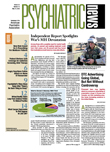New evidence on clinical characteristics of patients with bipolar disorder suggests that rapid cycling takes place along a continuum and that antidepressant use may be associated with an increased number of cycling episodes.
The findings come from an analysis of the Systematic Treatment Enhancement Program for Bipolar Disorder (STEP-BD) study published in the March American Journal of Psychiatry.
Lead author Christopher Schneck, M.D., told Psychiatric News that the findings indicated an association between antidepressant use and rapid cycling of moods, but emphasized that the relationship between the two was not necessarily causal and that he couldn't say with certainty whether antidepressant use could predict an increase in mood cycles in bipolar disorder patients.
In addition, he noted, an increased number of mood swings was associated with a more severe form of illness among subjects when they entered the study.“ Patients entering the study more depressed, more manic, or with poorer functioning were more likely to cycle” during the yearlong study, Schneck said
Schneck and colleagues followed 1,742 patients with bipolar I and II disorder for up to one year of treatment to distinguish clinical characteristics of those with and without rapid cycling.
Rapid cycling was defined as having four or more distinct mood episodes during the year prior to treatment.
Patients entering the study completed an Affective Disorder Evaluation so that researchers could learn, for instance, about age at onset of mood episodes, number of prior episodes, periods of recovery, current medications, and current mood state. Researchers also confirmed the bipolar diagnosis using the Mini International Neuropsychiatric Interview.
During follow-up visits, researchers used the Clinical Monitoring Form to assess symptoms and distinct mood episodes. Episodes were considered separate if the mood changed from one state to another of opposite polarity, or if the patient achieved euthymia for at least eight weeks and then experienced mania, hypomania, a mixed state, or depression. The researchers also administered treatments based on expert consensus guidelines such as those developed by APA.
Researchers divided patients into four groups determined by the number of affective episodes they experienced during the study period. More than 1,000 patients completed the study, and of those only 58 were considered to have rapid cycling. Of the remaining patients, 409 had no mood episodes after one year of treatment, 402 experienced one episode, and 322 had two or three episodes.
Of patients who reported experiencing rapid cycling in the year prior to the study, only 19 percent were stable through the yearlong study, compared with 41 percent who did not experience rapid cycling in the year prior to the study.
Schneck also found that patients who received antidepressants during the study period were 3.8 times as likely to experience rapid cycling, twice as likely to experience two or three mood episodes, and 1.7 times as likely to have one episode during the yearlong study compared with patients who did not receive antidepressants.
The authors noted that findings related to antidepressants must be considered cautiously for several reasons: patients who received antidepressants were not randomized to treatment, for instance, and researchers didn't gather specifics about the antidepressant treatment—that is, the type, dosage, or simultaneous use of other medications. “I think these findings tell us that we have to be careful when we prescribe antidepressants” to patients with bipolar disorder, Schneck said. “But we would need [to] administer antidepressants in a randomized, controlled fashion to be able to draw any conclusions about their effects” on rapid cycling, he added.
Other study limitations included that the researchers depended on patients' recollections to determine the past-year's occurrence of rapid cycling and mood episodes. Prospective observation, however, was determined using strict DSM-IV criteria.
In an editorial accompanying Schneck's article, S. Nassir Ghaemi, M.D., M.P.H., noted that “in the future, it will be difficult, as well as ethically challenging, to devise randomized clinical trials to test the hypothesis of worsening of rapid-cycling bipolar disorder with antidepressants,” and that in the meantime, “observational analyses such as this STEP-BD study will become even more influential for informing clinical care.”
